
The Bible is a collection of religious texts or scriptures sacred to Christians, Jews, Samaritans, Rastafari and others. It appears in the form of an anthology, a compilation of texts of a variety of forms that are all linked by the belief that they are collectively revelations of God. These texts include theologically-focused historical accounts, hymns, prayers, proverbs, parables, didactic letters, erotica, poetry, and prophecies. Believers also generally consider the Bible to be a product of divine inspiration.

The deuterocanonical books are books and passages considered by the Catholic Church, the Eastern Orthodox Church, the Oriental Orthodox Churches and the Assyrian Church of the East to be canonical books of the Old Testament but which are considered non-canonical by Protestant denominations. They date from the period 300 BC–AD 100 approximately. While the New Testament never quotes from or ascribes canonical authority to these books, some say there is a correspondence of thought, while others see texts from these books being paraphrased, referred or alluded to many times in the New Testament, particularly in the Pauline epistles depending in large measure on what is counted as a reference.

Theodor Seuss "Ted" Geisel was an American children's author, political cartoonist, illustrator, poet, animator, screenwriter, and filmmaker. He is known for his work writing and illustrating more than 60 books under the pen name Dr. Seuss (,). His work includes many of the most popular children's books of all time, selling over 600 million copies and being translated into more than 20 languages by the time of his death.
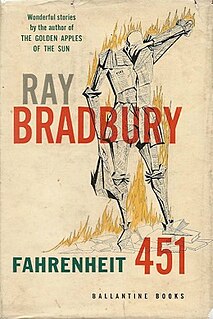
Fahrenheit 451 is a dystopian novel by American writer Ray Bradbury, first published in 1953. Often regarded as one of his best works, the novel presents a future American society where books are outlawed and "firemen" burn any that are found. The book's tagline explains the title: "Fahrenheit 451 – the temperature at which book paper catches fire, and burns..." The lead character, Guy Montag, is a fireman who becomes disillusioned with his role of censoring literature and destroying knowledge, eventually quitting his job and committing himself to the preservation of literary and cultural writings.
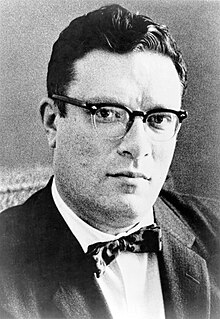
Isaac Asimov was an American writer and professor of biochemistry at Boston University. He was known for his works of science fiction and popular science. Asimov was a prolific writer who wrote or edited more than 500 books and an estimated 90,000 letters and postcards.

The International Standard Book Number (ISBN) is a numeric commercial book identifier which is intended to be unique. Publishers purchase ISBNs from an affiliate of the International ISBN Agency.
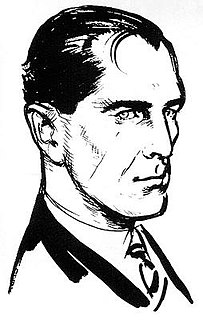
The James Bond series focuses on a fictional British Secret Service agent created in 1953 by writer Ian Fleming, who featured him in twelve novels and two short-story collections. Since Fleming's death in 1964, eight other authors have written authorised Bond novels or novelisations: Kingsley Amis, Christopher Wood, John Gardner, Raymond Benson, Sebastian Faulks, Jeffery Deaver, William Boyd and Anthony Horowitz. The latest novel is Forever and a Day by Anthony Horowitz, published in May 2018. Additionally Charlie Higson wrote a series on a young James Bond, and Kate Westbrook wrote three novels based on the diaries of a recurring series character, Moneypenny.

The Old Testament is the first part of the Christian biblical canon, which is based primarily upon the twenty-four books of the Hebrew Bible, a collection of ancient religious Hebrew writings by the Israelites believed by most Christians and religious Jews to be the sacred Word of God. The second part of Christian Bibles is the New Testament, written in the Koine Greek language.
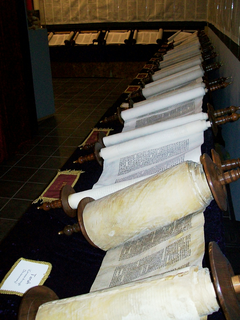
The Hebrew Bible, which is also called the Tanakh, or sometimes the Miqra (מִקְרָא), is the canonical collection of Hebrew scriptures, including the Torah. These texts are almost exclusively in Biblical Hebrew, with a few passages in Biblical Aramaic. The form of this text that is authoritative for Rabbinic Judaism is known as the Masoretic Text (MT) and consists of 24 books, while Protestant Bibles divide essentially the same material into 39 books. Catholic Bibles and Eastern / Greek Orthodox Bibles contain additional materials in their Old Testaments, derived from the Septuagint and other sources.

The Chronicles of Narnia is a series of fantasy novels by British author C. S. Lewis. Written by Lewis, illustrated by Pauline Baynes, and originally published in London between 1950 and 1956, The Chronicles of Narnia has been adapted for radio, television, the stage, and film. The series is set in the fictional realm of Narnia, a fantasy world of magic, mythical beasts, and talking animals. It narrates the adventures of various children who play central roles in the unfolding history of the Narnian world. Except in The Horse and His Boy, the protagonists are all children from the real world who are magically transported to Narnia, where they are sometimes called upon by the lion Aslan to protect Narnia from evil. The books span the entire history of Narnia, from its creation in The Magician's Nephew to its eventual destruction in The Last Battle.
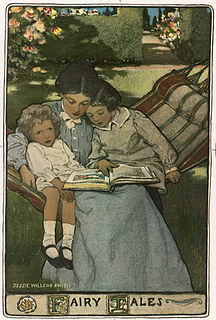
Children's literature or juvenile literature includes stories, books, magazines, and poems that are made for children. Modern children's literature is classified in two different ways: genre or the intended age of the reader.

Ian Lancaster Fleming was a British author, journalist and naval intelligence officer who is best known for his James Bond series of spy novels. Fleming came from a wealthy family connected to the merchant bank Robert Fleming & Co., and his father was the Member of Parliament for Henley from 1910 until his death on the Western Front in 1917. Educated at Eton, Sandhurst and, briefly, the universities of Munich and Geneva, Fleming moved through several jobs before he started writing.

Maya Angelou was an American poet, memoirist, and civil rights activist. She published seven autobiographies, three books of essays, several books of poetry, and is credited with a list of plays, movies, and television shows spanning over 50 years. She received dozens of awards and more than 50 honorary degrees. Angelou is best known for her series of seven autobiographies, which focus on her childhood and early adult experiences. The first, I Know Why the Caged Bird Sings (1969), tells of her life up to the age of 17 and brought her international recognition and acclaim.
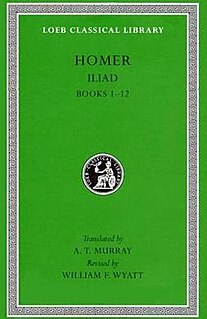
The Loeb Classical Library is a series of books, originally published by Heinemann in London, UK, today by Harvard University Press, US, which presents important works of ancient Greek and Latin literature in a way designed to make the text accessible to the broadest possible audience, by presenting the original Greek or Latin text on each left-hand page, and a fairly literal translation on the facing page. The General Editor is Jeffrey Henderson, holder of the William Goodwin Aurelio Professorship of Greek Language and Literature at Boston University.

Harry Potter is a series of seven fantasy novels written by British author J. K. Rowling. The novels chronicle the lives of a young wizard, Harry Potter, and his friends Hermione Granger and Ron Weasley, all of whom are students at Hogwarts School of Witchcraft and Wizardry. The main story arc concerns Harry's struggle against Lord Voldemort, a dark wizard who intends to become immortal, overthrow the wizard governing body known as the Ministry of Magic and subjugate all wizards and Muggles.

The biblical apocrypha denotes the collection of apocryphal ancient books thought to have been written some time between 200 BC and 400 AD. Some Christian Churches include some or all of the same texts within the body of their version of the Old Testament.

John Michael Green is an American author and YouTube content creator. He won the 2006 Printz Award for his debut novel, Looking for Alaska, and his fourth solo novel, The Fault in Our Stars, debuted at number one on The New York Times Best Seller list in January 2012. The 2014 film adaptation opened at number one at the box office. In 2014, Green was included in Time magazine's list of The 100 Most Influential People in the World. Another film based on a Green novel, Paper Towns, was released on July 24, 2015.

Commander James Bond is a fictional Intelligence Agent created by the British journalist and novelist Ian Fleming in 1953. He is the protagonist of the James Bond series of novels, films, comics and video games. Fleming wrote twelve Bond novels and two short story collections. His final two books—The Man with the Golden Gun (1965) and Octopussy and The Living Daylights (1966)—were published posthumously.
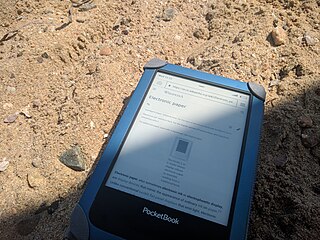
An electronic book, also known as an e-book or eBook, is a book publication made available in digital form, consisting of text, images, or both, readable on the flat-panel display of computers or other electronic devices. Although sometimes defined as "an electronic version of a printed book", some e-books exist without a printed equivalent. E-books can be read on dedicated e-reader devices, but also on any computer device that features a controllable viewing screen, including desktop computers, laptops, tablets and smartphones.

Apple Books is an e-book reading and store application by Apple Inc. for its iOS and macOS operating systems and devices. It was announced, under the name iBooks, in conjunction with the iPad on January 27, 2010, and was released for the iPhone and iPod Touch in mid-2010, as part of the iOS 4 update. Initially, iBooks was not pre-loaded onto iOS devices, but users could install it free of charge from the iTunes App Store. With the release of iOS 8, it became an integrated app. On June 10, 2013, at the Apple Worldwide Developers Conference, Craig Federighi announced that iBooks would also be provided with OS X Mavericks in fall 2013.
















